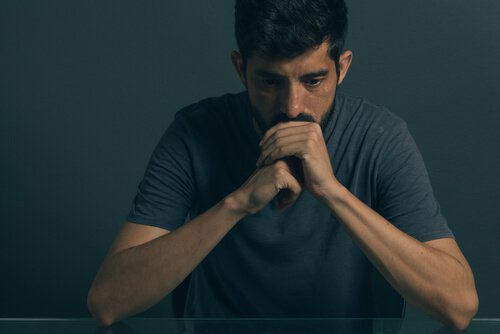Performance Anxiety with Sexual Dysfunctions

There are a lot of psychological factors that might stop someone from being able to engage in normal sexual activity. But today, the one we’re going to focus on is performance anxiety. In more colloquial terms, performance anxiety basically shows up when you worry too much about how good you are when it comes to sexual matters.
Performance anxiety is just like any other anxiety you start to face because of your expectations surrounding a specific context. For example, imagine a student who’s on their way to an oral exam. They have high expectations, they want to surprise the examiners and get the best possible grade. If they want to do that, they have to be perfect. But that puts so much pressure on their performance that they end up failing. Yet, if they hadn’t gotten so overworked about the whole thing, they probably would’ve gotten the results they wanted.
When it comes to sexual issues, performance anxiety can completely block someone’s ability to enjoy sex-related activities. There are also a wide range of secondary issues that come along with it. These include things like lower self-esteem and even bad communication with your partner. What all this leads to is sexual dysfunction.
What do we mean by anxiety?
Anxiety is a universal experience that’s also a part of the human condition. It’s kind of an alarm system we have to warn ourselves of threats. It’s an emotion that brings along bodily and behavioral changes, along with a general feeling of discomfort. Basically, anxiety has several benefits for us on an adaptive level. Here are some of them:
- Anxiety can help you focus your attention on a potential threat.
- It prepares your body to confront that threat: fight or flight.
- Thanks to it, you can memorize the stimuli and events surrounding the fear you felt.
- It allows you to form conditioned responses to that fear.
- It also allows you to modify some of your cognitive frameworks.

There are things in day to day life that might cause you anxiety, but that’s not the same as having anxiety as a chronic condition. For example, having anxiety about an exam can actually be a good thing. On the other hand, if it’s extremely intense or lasts a long time, that’s when you’re dealing with a chronic problem.
Performance anxiety is a type of chronic anxiety. It’s a true mental condition because it’s so intense that it stops you from actually fulfilling what you’d set out to do. In other words, if your anxiety stops you from having a satisfactory sex life, then you’re dealing with sexual performance anxiety.
Sexual response and dysfunctions that might come up
Although sexual response has a lot to do with our biology, there are also interpersonal, intrapersonal, and cultural contexts for it. What this means is that sexual performance involves a mix of biological, sociocultural, and psychological factors.
Even in a lot of clinical settings, they can’t accurately determine the origins of a sexual problem. Being diagnosed with sexual dysfunction also requires you to first rule out issues better explained by a non-sexual mental disorder, the effects of a substance, a medical problem, a major conflict in your relationship, violence, or other stress factors.

Sexual dysfunctions
Sexual dysfunctions include things like delayed ejaculation, erectile dysfunction, female orgasmic disorder, female sexual arousal disorder, genital-pelvic pain disorder, along with hypoactive sexual desire disorder, and premature ejaculation.
As you can see, sexual dysfunction involves a wide range of different issues. The main thing they have in common is a highly significant change in someone’s ability to respond sexually or experience sexual pleasure.
Performance anxiety with sexual dysfunctions
The best example of performance anxiety when it comes to sex is erectile dysfunction. It comes from what Abraham and Porto called “anxiety generating factors”. Here they are:
- Fear of failure. This involves being afraid they won’t perform well enough with their partner.
- Obligation to achieve results. This is the need for a consistent, long-lasting erection and a quick recovery.
- Excessive altruism. This has to do with being overly concerned with their partner’s satisfaction and not concentrating enough on their own sexual enjoyment.
- Self-observation. This involves looking at their penis to see how it’s responding, which some experts have called “the spectator’s role”.
When a man has erectile dysfunction issues, the first problems he has maintaining satisfactory sexual activity will probably happen by chance. It’s only after these times that he starts to worry about his performance, which is what causes the problem.
The concerns in his head might be about things like, “What if I can’t keep my penis hard?” or “What if I’m not pleasing my partner?” or “What will happen if I can’t penetrate?”. These worries then lead to the production of stress hormones like cortisol.

Worry is the basis for performance anxiety
The stress hormones generated by worry are completely incompatible with the ones that come into play with sexual response. This is how you get stuck in a vicious cycle. In a man’s case, he feels more and more pressure to achieve an erection during sex and please the other person. But if that’s the goal, he’s doomed to fail.
The anticipation of his next sexual encounter will give him the same anxiety and remind him of all his previous failures. Plus, this anticipation often kills his desire and makes him avoid all sexual activity. That means he’ll even avoid any physical sign of affection he thinks might lead to a sexual encounter.
The other person might end up feeling less loved, undesired, unattractive, frustrated… They don’t understand that avoiding sex entirely helps this person avoid another humiliation. It helps them feel more in control and less guilty for their “failures”. But that’s not the answer.
Performance anxiety with sexual dysfunctions can be treated. Clinical psychologists have come up with plenty of effective techniques to deal with it. If this is something you’re struggling with, you could seek help from a specialized psychologist. They’ll help you solve your problem and improve your sexual relationship with your partner.
There are a lot of psychological factors that might stop someone from being able to engage in normal sexual activity. But today, the one we’re going to focus on is performance anxiety. In more colloquial terms, performance anxiety basically shows up when you worry too much about how good you are when it comes to sexual matters.
Performance anxiety is just like any other anxiety you start to face because of your expectations surrounding a specific context. For example, imagine a student who’s on their way to an oral exam. They have high expectations, they want to surprise the examiners and get the best possible grade. If they want to do that, they have to be perfect. But that puts so much pressure on their performance that they end up failing. Yet, if they hadn’t gotten so overworked about the whole thing, they probably would’ve gotten the results they wanted.
When it comes to sexual issues, performance anxiety can completely block someone’s ability to enjoy sex-related activities. There are also a wide range of secondary issues that come along with it. These include things like lower self-esteem and even bad communication with your partner. What all this leads to is sexual dysfunction.
What do we mean by anxiety?
Anxiety is a universal experience that’s also a part of the human condition. It’s kind of an alarm system we have to warn ourselves of threats. It’s an emotion that brings along bodily and behavioral changes, along with a general feeling of discomfort. Basically, anxiety has several benefits for us on an adaptive level. Here are some of them:
- Anxiety can help you focus your attention on a potential threat.
- It prepares your body to confront that threat: fight or flight.
- Thanks to it, you can memorize the stimuli and events surrounding the fear you felt.
- It allows you to form conditioned responses to that fear.
- It also allows you to modify some of your cognitive frameworks.

There are things in day to day life that might cause you anxiety, but that’s not the same as having anxiety as a chronic condition. For example, having anxiety about an exam can actually be a good thing. On the other hand, if it’s extremely intense or lasts a long time, that’s when you’re dealing with a chronic problem.
Performance anxiety is a type of chronic anxiety. It’s a true mental condition because it’s so intense that it stops you from actually fulfilling what you’d set out to do. In other words, if your anxiety stops you from having a satisfactory sex life, then you’re dealing with sexual performance anxiety.
Sexual response and dysfunctions that might come up
Although sexual response has a lot to do with our biology, there are also interpersonal, intrapersonal, and cultural contexts for it. What this means is that sexual performance involves a mix of biological, sociocultural, and psychological factors.
Even in a lot of clinical settings, they can’t accurately determine the origins of a sexual problem. Being diagnosed with sexual dysfunction also requires you to first rule out issues better explained by a non-sexual mental disorder, the effects of a substance, a medical problem, a major conflict in your relationship, violence, or other stress factors.

Sexual dysfunctions
Sexual dysfunctions include things like delayed ejaculation, erectile dysfunction, female orgasmic disorder, female sexual arousal disorder, genital-pelvic pain disorder, along with hypoactive sexual desire disorder, and premature ejaculation.
As you can see, sexual dysfunction involves a wide range of different issues. The main thing they have in common is a highly significant change in someone’s ability to respond sexually or experience sexual pleasure.
Performance anxiety with sexual dysfunctions
The best example of performance anxiety when it comes to sex is erectile dysfunction. It comes from what Abraham and Porto called “anxiety generating factors”. Here they are:
- Fear of failure. This involves being afraid they won’t perform well enough with their partner.
- Obligation to achieve results. This is the need for a consistent, long-lasting erection and a quick recovery.
- Excessive altruism. This has to do with being overly concerned with their partner’s satisfaction and not concentrating enough on their own sexual enjoyment.
- Self-observation. This involves looking at their penis to see how it’s responding, which some experts have called “the spectator’s role”.
When a man has erectile dysfunction issues, the first problems he has maintaining satisfactory sexual activity will probably happen by chance. It’s only after these times that he starts to worry about his performance, which is what causes the problem.
The concerns in his head might be about things like, “What if I can’t keep my penis hard?” or “What if I’m not pleasing my partner?” or “What will happen if I can’t penetrate?”. These worries then lead to the production of stress hormones like cortisol.

Worry is the basis for performance anxiety
The stress hormones generated by worry are completely incompatible with the ones that come into play with sexual response. This is how you get stuck in a vicious cycle. In a man’s case, he feels more and more pressure to achieve an erection during sex and please the other person. But if that’s the goal, he’s doomed to fail.
The anticipation of his next sexual encounter will give him the same anxiety and remind him of all his previous failures. Plus, this anticipation often kills his desire and makes him avoid all sexual activity. That means he’ll even avoid any physical sign of affection he thinks might lead to a sexual encounter.
The other person might end up feeling less loved, undesired, unattractive, frustrated… They don’t understand that avoiding sex entirely helps this person avoid another humiliation. It helps them feel more in control and less guilty for their “failures”. But that’s not the answer.
Performance anxiety with sexual dysfunctions can be treated. Clinical psychologists have come up with plenty of effective techniques to deal with it. If this is something you’re struggling with, you could seek help from a specialized psychologist. They’ll help you solve your problem and improve your sexual relationship with your partner.
All cited sources were thoroughly reviewed by our team to ensure their quality, reliability, currency, and validity. The bibliography of this article was considered reliable and of academic or scientific accuracy.
- Shepardson, R. L., & Carey, M. P. (2015). Sexual Dysfunctions. In Encyclopedia of Mental Health: Second Edition. https://doi.org/10.1016/B978-0-12-397045-9.00014-8
- Hatzimouratidis, K., Amar, E., Eardley, I., Giuliano, F., Hatzichristou, D., Montorsi, F., … Wespes, E. (2010). Guidelines on Male Sexual Dysfunction: Erectile Dysfunction and Premature Ejaculation. European Urology. https://doi.org/10.1016/j.eururo.2010.02.020
- Mialon, A., Berchtold, A., Michaud, P. A., Gmel, G., & Suris, J. C. (2012). Sexual dysfunctions among young men: Prevalence and associated factors. Journal of Adolescent Health. https://doi.org/10.1016/j.jadohealth.2012.01.008
This text is provided for informational purposes only and does not replace consultation with a professional. If in doubt, consult your specialist.







